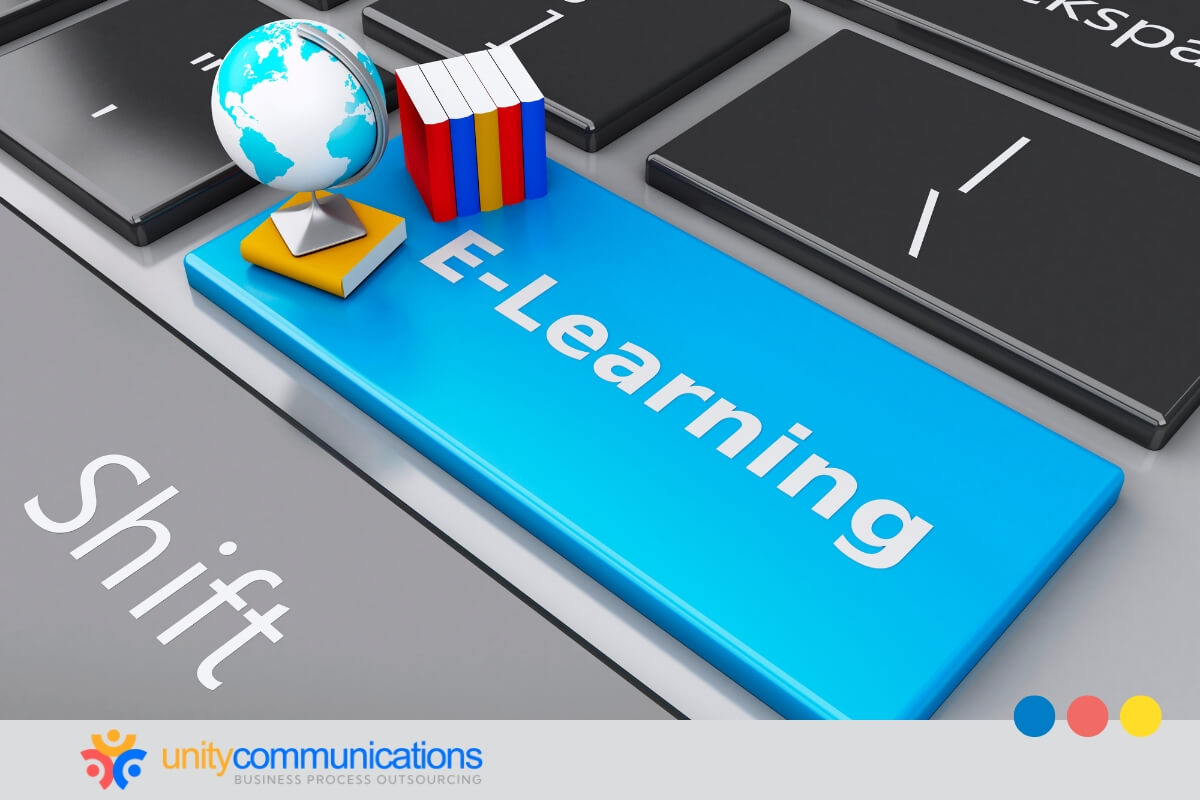IN THIS ARTICLE
Table of Contents
In a time of rapid technological advancements and changing educational paradigms, learning institutions utilize innovative solutions to stay competitive and thrive.
One strategy that is gaining popularity is business process outsourcing (BPO). This approach delegates non-core functions to specialized external partners to streamline operations and save on costs.
This article examines the increasing adoption of BPO in education, focusing on its many benefits and potential challenges. It also explores the practice’s transformative impact in enhancing online education.
Keep reading to learn more!
Overview of BPO in the education sector

BPO is the practice of contracting specific business tasks or processes to a third-party service provider. The global BPO market was achieved a value of $280.64 billion in 2023 and is set to grow at a compound annual growth rate (CAGR) of 9.6%. Its popularity stems from various industries actively using this approach to ensure long-term success.
BPO is a valuable strategy for simplifying business processes, minimizing operational expenses, and enhancing customer support services. Learning organizations can outsource various non-core functions to external specialists to achieve such advantages.
Below are common BPO services for educational institutions:
- Student enrollment and admissions assistance. BPO offerings customized for the online learning sector include comprehensive support for student enrollment and admissions. The provider handles surges in applications, validates documents, and streamlines admissions for students and the institution.
- Content development and curriculum design. BPO services for education include content development and curriculum design to help educators meet learner needs. Providers create interactive modules using engaging content such as e-books, videos, and simulations.
- Grading and assessment services. BPO providers offer support for grading assignments, conducting assessments, and providing feedback to students. This service relieves educators of administrative tasks and ensures consistent and fair evaluations through standardized processes and criteria.
- Online tutoring and academic support. Third-party online tutoring and academic support provide students with additional resources and guidance to enhance their learning experience.
- Data management and analytics. Learning establishments manage massive data on student records, academic performance, and administrative details. BPO services handle this data efficiently through accurate recordkeeping and secure storage while complying with data protection regulations.
- IT solutions. BPO providers specializing in education customize IT solutions to address the technological requirements of academic organizations. These include student information systems, learning management platforms, and other critical software.
- Help desk and student assistance. BPO services include a 24/7 help desk and student support for those with different schedules and time zones. Students can get help when needed, enhancing their satisfaction and learning experience with the institution’s services.
- Financial aid and billing management. BPO services for the education sector extend to overseeing efficient scholarship disbursement, student loan processing, and financial transaction management. Outsourcing companies help academic institutions maintain a transparent and well-organized financial framework.
Role of BPO in enhancing online education
The worldwide e-learning industry can expand at a CAGR exceeding 9% by 2030, indicating an increase in workload. This surge in demand, coupled with routine tasks such as admin support, lead generation, or enrollment, can divert attention from the primary goal of delivering exceptional education to students.
With that in mind, what is the role of BPO in enhancing online education?
BPO solutions for education offer many benefits, including multichannel communication management. By outsourcing interactions across email, chat, and phone, educational institutions can effectively engage with students, parents, and stakeholders, enhancing their overall experience.
Moreover, BPO services tailored for the online learning solutions sector emphasize quality assurance across various processes. Third-party service providers improve data entry accuracy, ensure compliance with academic regulations, and maintain educational standards with robust quality control.
Recognizing the fluctuating demands of academic cycles, BPO vendors also provide customized and adaptive scaling capabilities. They ensure efficient handling of peak periods, such as admissions or examination seasons, by swiftly adjusting resources to meet heightened workloads.
Finally, education-focused BPO providers are crucial in helping academic institutions meet industry standards and regulations. They diligently stay updated on changes in accreditation criteria, privacy laws, and other mandates, assuring the audience that the organization follows industry standards.
Technological innovations facilitated by BPO in the education sector

BPO has helped catalyze technological innovations that have significantly transformed learning and academic administration. Here are some critical advancements facilitated by BPO that help enhance online education:
- Learning management systems (LMS). LMS is a digital platform for course delivery, content management, assessment, and collaboration. They enhance organization, streamline communication, and improve access to educational resources for students and educators.
- Virtual classrooms. Virtual classrooms have interactive features such as live video conferencing, real-time chat, and collaborative whiteboards. They offer students and teachers an immersive online learning experience that promotes increased participation and instant feedback.
- Artificial intelligence (AI) in education. AI technologies simplify educational processes, enhancing the efficiency and effectiveness of teaching and learning. AI for education ranges from intelligent tutoring systems to automated grading, personalized learning pathways, and virtual assistants.
- Mobile learning solutions. Mobile learning applications allow students to access educational resources, complete assignments, and engage in learning activities anytime, anywhere. Students can continue learning by simply using smartphones or tablets.
- Online assessment and proctoring. BPO providers offer online assessment and proctoring solutions for secure, remote exams, quizzes, and tests. These offerings ensure academic integrity and compliance with evaluation standards.
- Student support chatbots. Powered by natural language processing (NLP) and machine learning (ML) algorithms, chatbots provide instant support and guidance to students regarding course information, assignments, deadlines, and academic questions.
Challenges and considerations when adopting BPO for online education
Learning institutions must be aware of unique considerations that come with implementing BPO services to enhance online education. These BPO challenges include securing data, maintaining quality standards, preserving institutional identity and culture, and addressing resistance from staff members who fear job displacement.
Below is a closer look at these challenges and their respective solutions:
- Data security and privacy. The continuous exchange of sensitive student and institutional data demands robust data security measures and compliance with privacy regulations. Understand and implement strategies aligned with laws such as the Family Educational Rights and Privacy Act (FERPA).
- Quality control and assurance. Maintaining the quality and consistency of educational services and support provided by BPO partners is essential. Learning institutions must establish clear performance metrics, monitoring mechanisms, and quality assurance protocols to uphold educational standards at all times.
- Integration with existing systems. Seamless integration of BPO services with existing online learning platforms, student information systems, and administrative workflows is crucial for operational efficiency. By maintaining compatibility and interoperability between systems, organizations can minimize disruptions and maximize productivity.
- Staff retention and transition management. Introducing BPO might lead to concerns among existing staff about job security or changes in roles and responsibilities. Transparent communication, retraining opportunities, and support for staff affected by outsourcing can mitigate resistance and ease the transition.
- Preservation of institutional identity and values. Outsourcing certain functions may raise concerns about keeping the institution’s identity and values intact. To uphold institutional integrity, academic organizations must find BPO partners that align with their mission, vision, and educational philosophies.
Educational institutions and e-learning platforms need to find the right service provider for successful BPO integration. They must carefully consider essential factors to guarantee compatibility, reliability, and alignment with their goals and values. Here are critical steps to guide the selection process:
- Clearly outline the functions you plan to outsource and your desired outcomes.
- Look for a BPO partner with relevant experience in education and e-learning.
- Ensure compatibility with your systems and proficiency in relevant technologies.
- Inquire about quality control processes and adherence to standards.
- Prioritize data protection measures and compliance with regulations.
- Ensure alignment with your institution’s values and effective communication.
- Check the BPO company’s ability to scale services as needed.
- Assess affordability and transparency in pricing.
- Request references and perform due diligence on the BPO firm’s track record.
- Clarify contract terms, service-level agreements (SLAs), and dispute resolution mechanisms.
The bottom line

BPO for education encompasses a range of offerings tailored to support various aspects of learning delivery and academic administration. These BPO services enable institutions and learning platforms to streamline operations, enhance online education, uphold industry standards, embrace innovations, and, ultimately, improve the learning experience for students.
However, implementing BPO in the online education sector also presents risks. By proactively addressing these challenges, institutions can harness the power of BPO and maintain a competitive edge in a fast-evolving industry.
Let’s connect if you are you an e-learning platform looking to adopt BPO to enhance your online education initiatives.





